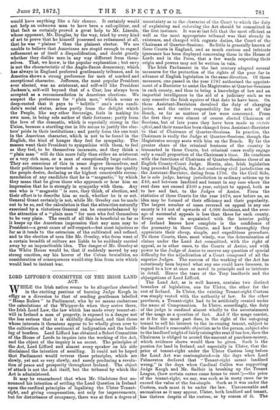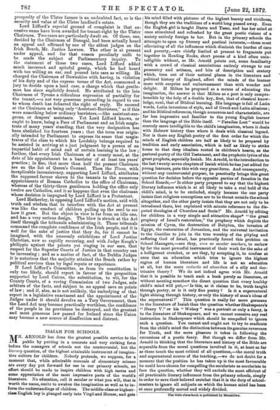LORD 1111 .t ORD'S COMMITTEE ON THE IRISH LAND ACT.
WHILE the Irish nation seems to be altogether absorbed in the exciting pastime of burning Judge Keogh in effigy as a diversion to that of sending gentlemen labelled "Home Rulers" to Parliament, who by no means embarrass the calculations of the Whipper-In when they arrive there, the Irish Land Law, the law which has made every tenant-at- will in Ireland a man of property, is exposed to a danger not the less serious that it is skilfully disguised, and that those whose interests it threatens appear to be wholly given over to the cultivation of the sentiment of indignation and the build- ing of bonfires. Lord Lifford has obtained a Select Committee of the House of Lords to inquire into the working of the Act, and the object of the inquiry is no secret. The principles of the Act, Lord Lifford and almost every speaker on his side disclaimed the intention of assailing. It could not be hoped that Parliament would reverse those principles, which are slowly, yet not so very slowly, and surely producing a revolu- tion of peace and prosperity throughout Ireland. The object of attack is not the Act itself, but the tribunal by which the Act is administered.
It may be remembered that when Mr. Gladstone first an- nounced his intention of settling the Land Question in Ireland upon the cardinal principles of legalising the Ulster Tenant- right, and giving compensation, not only for improvements, but for disturbance of occupancy, there was at first a degree of
would have anything like a fair chance. It certainly would uncertainty as to the character of the Court to which the duty
of explaining and enforcing the Act should be committed in the first instance. It was at last felt that the most efficient as well as the most appropriate tribunal was that already in existence, and charged with cognate duties, the Court of the Chairman of Quarter-Sessions. So little is generally known of these Courts in England, and so much curious and intricate ignorance has been displayed concerning them in the House of Lords and in the Press, that a few words respecting their origin and powers may not be written in vain.
The Irish Parliament in the last century adopted several measures for the protection of the rights of the poor far in advance of English legislation in the same direction. Of these measures, one passed in the year 1787 authorised the appoint- ment of a Barrister to assist the Magistrates at Quarter-Sessions in each county, and thus to bring a knowledge of law and an impartial intelligence to the aid of a judiciary such as we may conceive the Irish squires of that date to have been. On these Assistant-Barristers devolved the duty of charging juries, and the entire responsibility for the acts of the Bench, so far as matters of law were concerned. From the first they were almost of course elected Chairmen of Sessions, but of late years they have been made so virtute officii,and their name has been changed from Assistant-Barrister to that of Chairman of Quarter-Sessions. In practice, the Chairman is really the Judge at Quarter-Sessions, though the Magistrates occupy seats with him on the Bench. By far the greater share of the criminal business of the country is transacted in these Courts, but criminal cases really engage only a small proportion of the Chairman's time. He combines with the functions of Chairman of Quarter-Sessions those of an English County-Court Judge. Herein, also, Irish legislation long preceded English, the Act conferring civil jurisdiction on the Assistant-Barrister, dating from 1796. On the Civil Side, he is sole judge, having jurisdiction in ordinary actions up to £40, and between landlord and tenant in any case where the rent does not exceed £100 a year, subject to appeal, both as to law and fact, to the Judges of Assize. From the statistics of these Courts for the year 1870, now before us, an idea may be formed of their efficiency and their popularity. The largest number of cases reversed on appeal in any one county is 14 out of upwards of 4,000 decisions, and the aver- age of successful appeals is less than three for each county. Every one who is acquainted with the interior polity of Ireland knows how complete is the confidence of the peasantry in these Courts, and how thoroughly they appreciate their cheap, simple, and expeditious procedure. To these Courts, then, most wisely, was the determination of claims under the Land Act committed, with the right of appeal, as in other cases, to the Courts of Assize, and with power to the Judge of Assize to reserve any question of special difficulty for the adjudication of a Court composed of all the superior Judges. The success of the working of the Act has notoriously been beyond what any one could have foreseen, in regard to a law at once so novel in principle and so intricate in detail. Hence the tears of the Tory landlords and the objurgations of Lord Lifford.
The Land Act, as is well known, contains two distinct branches of legislation, one for Ulster, the other for the rest of Ireland. In Ulster, the existing Tenant-right Custom was simply vested with the authority of law. In the other provinces, a Tenant-right had to be artificially created under the name of Compensation. In Ulster, accordingly, the duty of the judge is confined almost wholly to the ascertainment of the usage as a question of fact. And if the usage consist, as it for the most part does, in the right of the out-going tenant to sell his interest to the in-coming tenant, subject to the landlord's reasonable objection as to the person, subject also to the landlord's right of fairly raising the rent if too low, then the Chairman is obliged to accord the amount of purchase-money, which evidence shows would then be given. Such is the passion for land in Ireland, and especially in Ulster, that the price of tenant-right under the Ulster Custom long before the Land Act was contemplated—in the days when Lord Palmerston declared that "Tenant-right meant landlord wrong," in the days when Cardinal Callen was supporting Judge Keogh and Mr. Sadleir in breaking up the Tenant League, (how certain curses come home to roost 1)—the price of the tenant-right, we say, was such as in many cases far to
exceed the value of the fee-simple. Such as it was under the Custom, such must it be under the law. Unreasonable and anomalous as it may appear, Ulster, both landlord and tenant, has thriven despite of the custom, or by reason of it. The
prosperity of the Ulster farmer is an undoubted fact, so is the security and value of the Ulster landlord's estate.
Lord Lifford's especial ground of complaint is that ex- cessive sums have been awarded for tenant-right by the Ulster Chairmen. Two cases are particularly dwelt on. Of these, one, decided by the Chairman of Donegal, had been actually heard on appeal and affirmed by one of the ablest judges on the Irish Bench, Mr. Justice Lawson. The other is at present under appeal, and for that reason peculiarly unfit to be made the subject of Parliamentary inquiry. To the statement of these two cases, Lord Lifford added much incorrect and spiteful gossip, which he had heard with too willing an ear, and poured into ears as willing. He charged the Chairman of Downshire with having, in violation of his duty and of the express terms of the Act, summoned a jury to decide upon a land case, a charge which that gentle- man has since explicitly denied. He attributed to the late Chairman of Tyrone a ridiculous expression of partiality for the tenant,—a not very generous proceeding in regard to one to whom death has debarred the right of reply. He sneered at the Chairmen as being only "Assistant-Barristers," as if this were something below ordinary barristers,—like assistant-sur- geons, or drapers' assistants. Yet Lord Lifford knows, or ought to know, being a Peer of Parliament and an Irish magis- trate of many years' standing, that the very designation has been abolished for fourteen years ; that the term was origin- ally intended by Parliament to express its sense that magis- trates of the class to which his Lordship belongs required to be assisted in arriving at a just judgment by a person of an impartial habit of mind and of certain learning in the law ; further, that every Irish Chairman of a county must, at the date of his appointment be a barrister of at least ten years' practice ; in fine, that more than half the present Chairmen are on the list of Queen's Counsel. Then the Times, with inexplicable inconsistency, supporting Lord Lifford, attributes the supposed favour shown to the tenants to the numerous appointments of Roman Catholics to the office of Chairman, whereas of the thirty-three gentlemen holding the office only twelve are Catholics, and it so happens that even the chairman whose decision is impugned by Lord Lifford is a Protestant.
Lord Hatherley, in opposing Lord Lifford's motion, said with truth and wisdom that to interfere with the Act at present was like the conduct of children pulling up the seed to see how it grew. But the object in view is far from an idle one, and has a very serious design. The blow is struck at the Act itself through the tribunals administering it. Those tribunals command the complete confidence of the Irish people, and it is well for the sake of justice that they do, for it cannot be imagined, with the unseemly exhibitions of Lord Justice Christian, now so rapidly recurring, and with Judge Keogh's philippic against the priests yet ringing in our ears, that respect for the Superior Courts of Justice in that country can I be increasing ; and as a matter of fact, of the Dublin Judges it is notorious that the majority attained the Bench rather by political services than by legal repute or experience. If Lord Lifford's Committee, as from its constitution is only too likely, should report in favour of the proposition supported by Lord Cairns, the substitution, to wit, for the County Courts, of a roving Commission of two Judges, sole arbiters of the facts, and subject to no appeal save on points of law ; and if, also, as is not unlikely, the embodying of that report in a legislative enactment and the appointment of the Judges under it should devolve on a Tory Government, then the Land Act may become practically worthless, the confidence of the people in its provisions be destroyed, and the greatest and most generous law passed for Ireland since the Union may become a new source of disaffection and distrust.



































 Previous page
Previous page